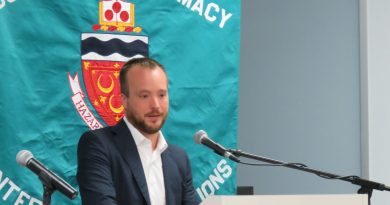USA Debate Highlights New Generation of Civic-Minded Students
By Abby Shamray
Editor-in-Chief
“The American Dream is dead.”
“What I mean by job creation is literally to create jobs.”
“Are we going to place climate change ahead of poverty?”
Tensions were high in the University Center as the College Democrats and College Republicans debated on policy differences, but underlying the event was a sense of mutual respect and a common goal for a better future for America.
The debate, hosted by the Unified Students’ Assembly and co-sponsored by the Student Government Association, is the first of its kind on the Seton Hall campus. Almost a hundred students showed up on October 19 to watch their fellow students defend their respective parties’ positions. The event started with each side giving two-minute opening statements, followed by a dozen questions and many more rebuttals.
Ajiya Doka, a junior Diplomacy major and the president of College Democrats, told the Envoy that in order to prepare for the debate, she and her team focused on what it means to be a Democrat and studied the official party platform. Similarly, Edward Colombo, a senior political science major and President of the College Republicans, said that his team prepared by analyzing the Republican Party platform and public policy stances.
Doka was joined on stage by two juniors, Parker White and Anthony Antonini, and Siddharth Bector, a freshman. Colombo was accompanied by Brian Mulligan, a junior, Victor Vieira, and John Soper, both sophomores. The moderators were Zachariah Boyer, a senior political science major and the president of USA, Maggie Bach, assistant dean of Student Life, and Brianna Bernath, assistant news editor of The Setonian.
The purpose of the debate was not to focus on Hillary Clinton and Donald Trump and whether or not either of them were the right candidate, but rather what each party believes should be America’s future. “Our party isn’t represented by one man or one woman,” Colombo said about his party’s standard-bearer, Donald Trump. The topics ranged from student debt, taxes, energy policy, race relations, to transgender rights. The debaters also accepted questions from the audience on refugees and whether individual votes count.
The most heated part of the debate was the discussion on poverty and a social safety net. Both sides questioned whether or not each other’s platform best served the needs of those who live at or below the poverty line. The debaters all approached the issue from different perspectives on how to help the poor achieve a better standard of living. Two questions were asked regarding this issue and both sides used all their opportunities for rebuttal. The Republicans emphasized giving people an opportunity to climb the “ladder of economic success” instead of relying on the safety net, while the Democrats rallied for a higher minimum wage.
In their concluding remarks, the College Democrats and College Republicans made a point to mention that the debate had been “substantive and civilized.” A huge emphasis was placed on the importance of voting to the students in the audience. The debaters said it was vital for students to show that they represent the future of each party, rather than the two presidential candidates who would appear in the debate later that night.

